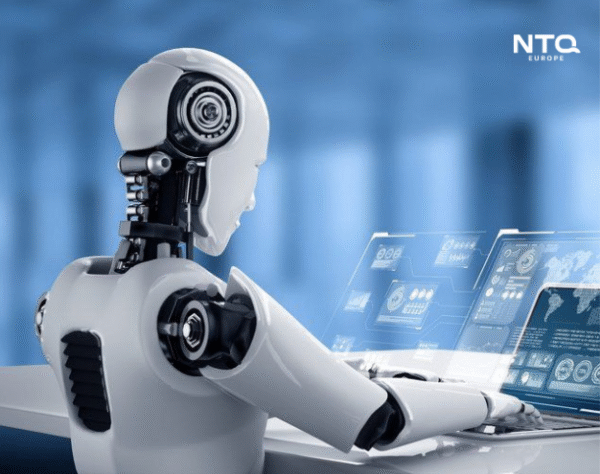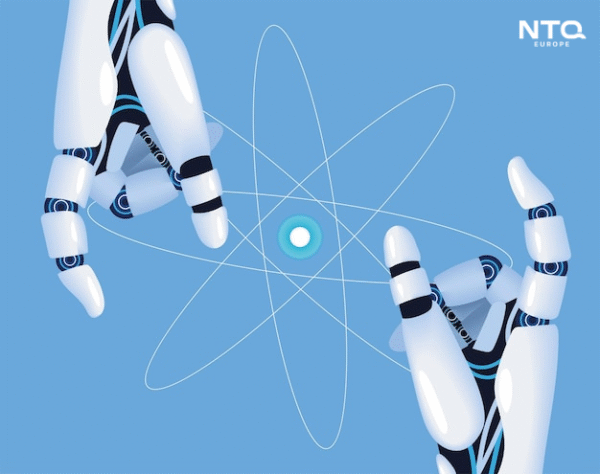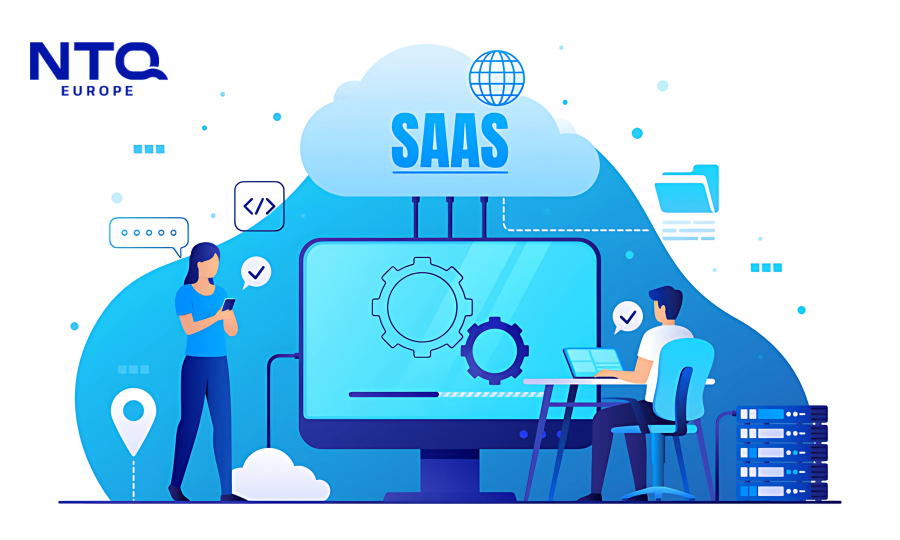1. Introduction to AI Consulting & Strategy
In today’s fast-paced digital era, artificial intelligence (AI) is no longer a futuristic concept; it’s a driving force of digital transformation. AI strategy consulting has emerged as a vital service for businesses aiming to stay competitive, innovate rapidly, and make data-driven decisions.
AI consulting services offer expert guidance on how to adopt, integrate, and optimize AI technologies, including strategic planning, use-case discovery, technology selection, deployment, and governance. A well-developed AI consulting & strategy provides businesses with a roadmap to leverage the full potential of AI while aligning with organizational goals.
AI offers data-driven insights and predictive analytics, accelerates the product development cycle while streamlining your workflow, and minimizing manual errors.
With the ability to process huge amounts of data, learn from user behavior, and automate complex processes, AI is widely adopted across a broad range of industries, including:
- Finance: Fraud detection, algorithmic trading, credit risk modeling.
- Healthcare: Medical imaging analysis, predictive diagnostics, and personalized treatment.
- Manufacturing: Predictive maintenance, quality control, and robotics automation.
- E-commerce: Recommendation engines, customer behavior analytics, and demand forecasting.
AI consulting firms allow your businesses to develop tailor-made strategies to create measurable impacts and deliver real results.

2. AI Strategy Development
An actionable AI development strategy allows your business to improve performance, optimize costs, and gain a competitive advantage toward sustainable growth in the digital age.
Defining the AI Roadmap
To successfully develop an AI strategy, it is essential to understand the business landscape, set the right goals, and define key performance indicators (KPIs).
Therefore, you can assess business and stakeholder alignment, opportunity analysis, budget, and resource planning to achieve short-term or long-term growth.
Data Analytics & Machine Learning
The cornerstone of any AI project is data. Enterprises must first ensure they have clean, structured, and accessible datasets. Data engineers and scientists then utilize this information to train machine learning models and power AI applications.
AI strategy consulting also addresses how businesses can mature their data practices from descriptive analytics to predictive and prescriptive insights, allowing your business to make real-time decisions.
AI-Driven Automation
Whether it’s robotic process automation (RPA), intelligent document processing, or AI-based customer support, AI significantly reduces manual workloads while increasing throughput.
AI consulting services allow your businesses to identify potential automation opportunities, implement intelligent workflows and monitor automation for continuous improvement.
AI Risk Management & Governance
As AI technologies become more pervasive, so do the associated risks. Ethical concerns such as bias in algorithms, lack of transparency, and data privacy issues must be addressed proactively.
A sound AI strategy includes policies and frameworks to:
- Ensure ethical AI design
- Monitor model behavior and performance
- Stay compliant with regulatory requirements (e.g., GDPR, the upcoming EU AI Act)
- Align with national or international AI frameworks
By taking a transparent approach to AI deployment, your businesses can build meaningful, long-term trust with users, regulatory authorities, and key stakeholders.

3. AI Consulting Services
AI consulting companies offer expert guidance at every stage, from strategy development to hands-on implementation.
Industry-Specific AI Consulting
Every industry has its nuances and specific challenges. Experienced AI consulting firms bring domain knowledge that helps translate business problems into viable AI solutions.
Examples include:
- Retail & E-commerce: Inventory prediction, pricing optimization, and chatbot assistance.
- Telecommunications: Churn prediction, network optimization.
- Logistics: Route planning, fleet analytics.
- Public Sector: Policy impact simulations, citizen services automation.
This vertical-focused approach ensures faster time-to-value and higher success rates in AI adoption.
Custom AI Development & Deployment
Not all businesses can rely on off-the-shelf AI tools. Many require customized models and platforms that align with internal systems, data formats, and customer expectations.
AI consulting companies assist with:
- Developing AI models from scratch
- Integrating AI into legacy systems
- Creating AI-powered apps or platforms
- Running pilot projects to test performance and scalability
This level of customization makes AI more relevant and impactful across business processes.
AI Training & Change Management
Technology is not the sole driving force of transformation, it’s people who truly lead the change. Many AI consulting companies provide structured training programs to help employees understand and embrace AI.
These training programs include understanding AI concepts and workflows, interacting with AI tools and dashboards, ethical AI usage and data privacy.
Additionally, business should implement AI-related change management activities to ensure that AI integration into your system enhances human abilities rather than replacing them.
AI Governance & Compliance
AI governance refers to frameworks, principles, standards, and regulations to manage and use AI technology.
By embedding governance and compliance into the entire AI development lifecycle, from strategy and design to deployment and monitoring, your businesses are able to protect privacy and data security while building long-term trust with users, regulatory authorities, and key stakeholders.
4. AI Implementation Process
Having a sound strategy and a trusted AI consulting firm is only part of the equation. Execution is where many businesses face technical, operational, and cultural hurdles. A structured and phased AI implementation process helps organizations move from ideation to real-world impact.
Assessment & Needs Identification
To understand whether a business is ready for AI adoption or not, you should assess current operations, data infrastructure, talent readiness, and strategic goals to set the key KPI and success metrics.
Many AI consulting companies offer readiness assessments to help businesses identify realistic AI use cases and determine ROI expectations.
Technology Selection & AI Model Development
To choose the right technology stack from cloud platforms to AI frameworks and tools, businesses need to evaluate factors such as scalability, integration capability, vendor support, and cost.
Popular AI platforms include Google AI, AWS AI and Azure AI.
Once the stack is selected, AI models are built and trained using historical and real-time data. This often involves:
- Feature engineering and data labeling
- Model selection (e.g., regression, classification, NLP, image recognition)
- Training, testing, and validation
- Performance tuning and bias detection
Integration & Testing
With models trained and ready, they are integrated into business systems such as CRM, ERP, or custom applications. This phase ensures that AI becomes a seamless part of day-to-day operations, not just a siloed experiment.
Integration includes:
- API development and system compatibility
- Workflow automation and dashboard creation
- UAT (User Acceptance Testing) with real business users
- Security and access control configuration
Experienced AI consulting services teams also help monitor model behavior in production to detect concept drift, performance degradation, or user resistance.
Optimization & Scaling
Once deployed, AI systems require continuous monitoring, retraining, and refinement. Businesses should also look to scale successful pilots across departments or geographies.
Optimization focuses on:
- Improving accuracy and response time
- Enhancing user experience and adoption
- Automating model updates with new data
- Expanding to additional use cases or customer segments
A long-term AI strategy includes MLOps (Machine Learning Operations) practices for managing the AI lifecycle at scale, ensuring models remain reliable and relevant.
5. Choosing the Right AI Consulting Partner
To select the right AI consulting partner, businesses should consider their expertise, industry experience, engagement model as well as collaboration approach.

Key Criteria for Evaluating AI Consulting Firms
Here are some factors to consider when evaluating AI consulting firms:
- Domain Expertise: Do they understand your industry and its pain points?
- Technical Capabilities: Can they develop custom AI models and integrate them seamlessly?
- Track Record: Have they delivered successful projects at scale?
- Ethical Standards: Do they follow best practices in AI governance and fairness?
- Support Model: Will they provide ongoing maintenance, updates, and training?
In-House AI vs. Consulting Services
Many companies wonder whether to build their AI capabilities in-house or rely on external partners. Both approaches have merits, but AI consulting services offer distinct advantages, especially for small to mid-sized enterprises.
|
Aspect |
In-House AI |
AI Consulting Services |
|
Time to Market |
Longer |
Faster |
|
Cost |
High (hiring, tools) |
Scalable & controlled |
|
Flexibility |
Limited |
Broad expertise, tailored solutions |
|
Risk |
Higher (steep learning curve) |
Mitigated (expert oversight) |
A hybrid approach, where internal teams work closely with consultants, often yields the best results.
6. NTQ Europe’s AI Consulting & Strategy
The successful AI adoption requires a clear AI strategy, seamless technology integration and deep domain knowledge. NTQ Europe provides comprehensive AI consulting services, enabling European businesses to unlock value from AI.
End-to-End AI Solutions
We offer comprehensive AI consulting services, from initial assesment to production deployment:
- Strategic workshops to define your AI vision
- Use-case identification and feasibility analysis
- Custom model development and system integration
- AI governance, ethical AI design, and risk mitigation
- Post-deployment support and optimization

Flexible & Scalable Strategy Building
We co-create AI strategies with our clients that align with current needs while planning for future scalability. Our AI consultants work across departments to identify synergies and deliver solutions that are adaptable and sustainable.
Our approach includes:
- Agile development sprints
- Feedback-driven model iterations
- Clear success metrics and KPIs
- Executive and team training programs
Seamless Integration with Existing Systems
NTQ Europe ensures that AI doesn’t disrupt your business, it enhances it. We help integrate AI into your current tech stack, ERP, CRM, or proprietary platforms, ensuring minimal downtime and maximum productivity.
Whether it’s automating operations or empowering data teams with new capabilities, our clients benefit from:
- Faster process cycles
- Reduced manual errors
- Enhanced customer experience
Security & Compliance
NTQ Europe adheres strictly to GDPR and international standards. We also implement security protocols at every stage of the product development lifecycle to protect sensitive data and ensure the integrity of systems.
7. Conclusion
The road to AI success is paved with clear vision, actionable strategy, and the right expertise. AI consulting & strategy help your businesses harness the power of AI to transform operations, drive innovation, and stay ahead of the curve.
A well-executed AI strategy aligns business goals with technical capabilities, ensuring that ethics, security, and compliance are safeguarded. Choosing the right AI consulting company enables you to avoid costly pitfalls and unlock the full value of your investment.
With a combination of technical depth, a pool of talent, and a collaborative mindset, NTQ Europe is proud to be a trusted partner for European businesses seeking AI solutions. We provide end-to-end AI services, including AI readiness assessments, strategy development, custom implementation, and post-deployment support, tailored to your business needs.



















